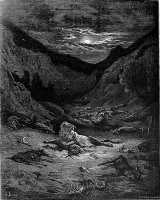The Lion
The Lion by Jean de La Fontaine is not a book, but a character from his famous collection of fables, where the lion often appears as the king of the animal kingdom symbolizing strength and power. His fables are moral-driven narratives where animals personify human folly and virtue. La Fontaine's fables, including the ones that feature the lion, are renowned for their wit, plain language, and insightful social commentary.
Through spoil and plunder, wealthy grown, A Leopard once claimed as his own, In meadows broad, and forests deep, Full many a steer, and stag, and sheep. At length, upon some luckless morn, Not far away, a Lion born, Received, as usual is with great ones, The compliments well known as state ones. But this once done, King Leopard said To Mr. Fox, his vizier keen, "I know you suffer from the spleen, Because this Lion-whelp is bred. But why be fearful, since his father Is in deaths keeping? Pity, rather, This orphan child, disconsolate, For he will have a lucky fate, If he, instead of seeking strife, Can but contrive to save his life." The Fox replied, "For orphans such My pity is not over much. In fact, two things alone remain,-- His friendship by some means to gain, Or else to kill him, ere he grows Too strong for all the world t' oppose. His horoscope I've duly cast, And find that he will ever be To us the bitterest enemy, But to allies he will cling fast. So, now, decide: become his friend, Or straightway of him make an end." But argued thus the Fox in vain: The Leopard slept, with all his train, Until the Lion's whelp, full grown, Spread havoc, and made all his own. Then Mr. Fox, with careworn brow, Appealed to, said, "'Tis useless, now, To think of meeting force by force: Suppose to friends you had recourse, They would but eat up all your store, And Master Lion does no more. But, sire, remember that the Lion Has got three friends he can rely on, Who ask for neither pay nor food,-- Strength, Vigilance, and Fortitude. So, send him now a sheep or two; If that won't answer, lambs a few; And if he's not content with that, A heifer add, both large and fat; For by this means, perchance, you may Save something from this beast of prey." Thus spoke the Fox; but to his master Th' advice seemed ill; and thence disaster Spread over all the country round; For still, combine as might the states, Republics, cities, potentates, They still the Lion master found. If you would now the moral know, Just to this brief advice attend:-- If you have let a Lion grow, Take care that he becomes your friend.
Translation
Translate and read this book in other languages:
Select another language:
- - Select -
- 简体中文 (Chinese - Simplified)
- 繁體中文 (Chinese - Traditional)
- Español (Spanish)
- Esperanto (Esperanto)
- 日本語 (Japanese)
- Português (Portuguese)
- Deutsch (German)
- العربية (Arabic)
- Français (French)
- Русский (Russian)
- ಕನ್ನಡ (Kannada)
- 한국어 (Korean)
- עברית (Hebrew)
- Gaeilge (Irish)
- Українська (Ukrainian)
- اردو (Urdu)
- Magyar (Hungarian)
- मानक हिन्दी (Hindi)
- Indonesia (Indonesian)
- Italiano (Italian)
- தமிழ் (Tamil)
- Türkçe (Turkish)
- తెలుగు (Telugu)
- ภาษาไทย (Thai)
- Tiếng Việt (Vietnamese)
- Čeština (Czech)
- Polski (Polish)
- Bahasa Indonesia (Indonesian)
- Românește (Romanian)
- Nederlands (Dutch)
- Ελληνικά (Greek)
- Latinum (Latin)
- Svenska (Swedish)
- Dansk (Danish)
- Suomi (Finnish)
- فارسی (Persian)
- ייִדיש (Yiddish)
- հայերեն (Armenian)
- Norsk (Norwegian)
- English (English)
Citation
Use the citation below to add this book to your bibliography:
Style:MLAChicagoAPA
"The Lion Books." Literature.com. STANDS4 LLC, 2025. Web. 22 Jan. 2025. <https://www.literature.com/book/the_lion_2661>.




Discuss this The Lion book with the community:
Report Comment
We're doing our best to make sure our content is useful, accurate and safe.
If by any chance you spot an inappropriate comment while navigating through our website please use this form to let us know, and we'll take care of it shortly.
Attachment
You need to be logged in to favorite.
Log In